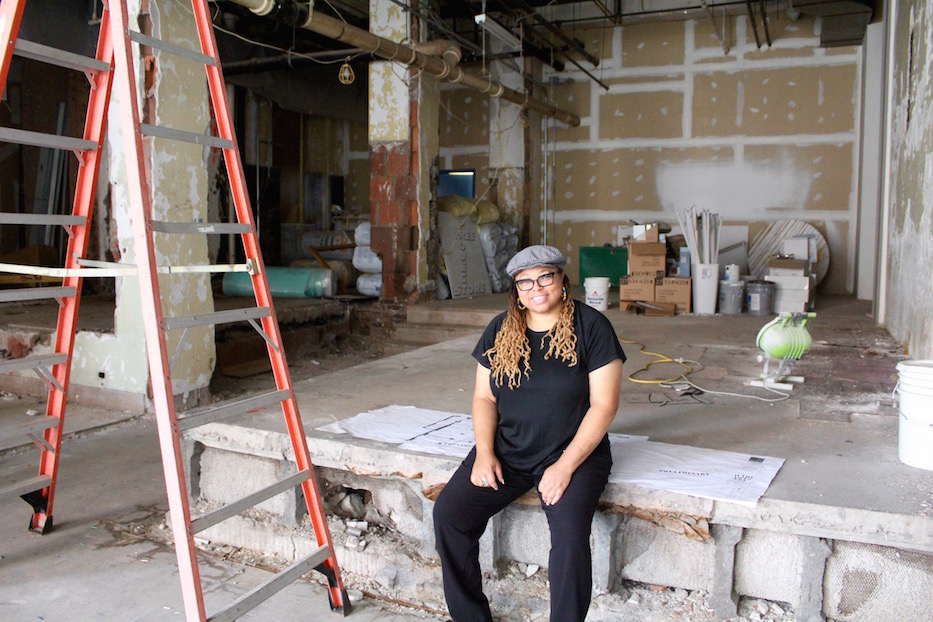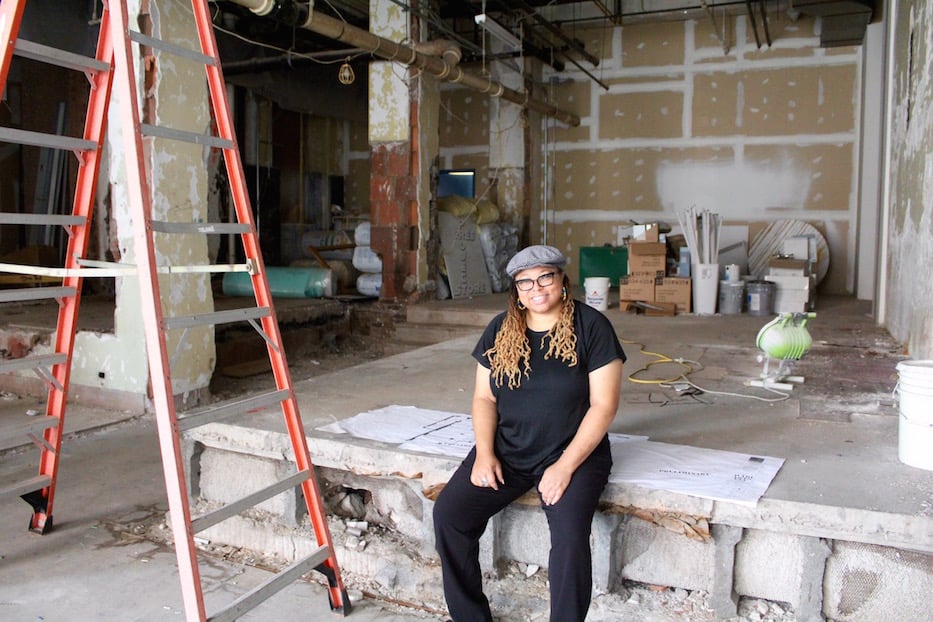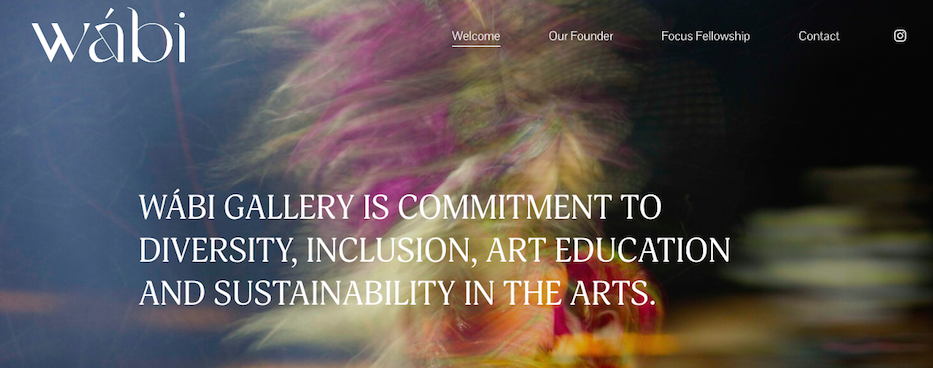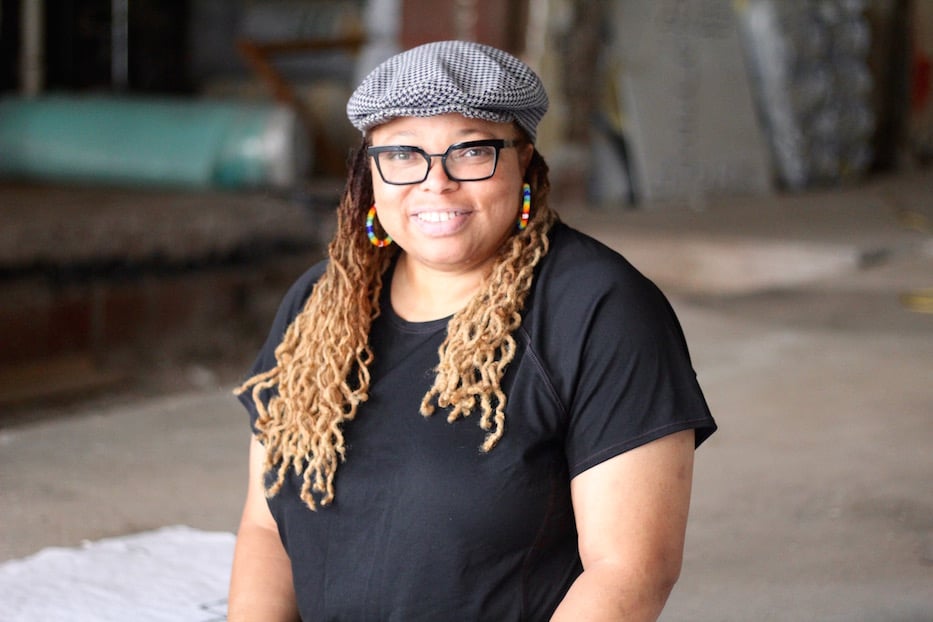
Downtown | Economic Development | Education & Youth | Photography | Arts & Culture | Arts & Anti-racism

Photographer Kim Weston inside the future home of Wábi Gallery at 124 Court Street. She secured the space in May of this year. Lucy Gellman Photo.
The corner is still a nest of exposed wires and unpainted walls, but photographer Kim Weston can already see a coworking space taking shape. Two ladders stand in what will be the gallery, where student photographs will hang a year from now. Concrete crumbles on the home of a future ADA-accessible ramp. Paint falls from old pipes as water whooshes through them.
Weston is enthralled by all of it. For the artist, it’s already a creative home.
Weston is the mastermind behind Wábi Gallery, a nascent 1,994 square foot arts incubator at 124 Court St. in downtown New Haven. As the physical space waits for construction work, asbestos remediation and zoning approval this year, the gallery is launching online with its FOCUS Fellowship, a one-year program in photography designed for youth. For the artist, who was recently named a 2021 Connecticut Arts Hero, it’s a way to give back to the city that has nurtured her work for two decades.
Interested candidates, who must be between the ages of 14 and 19, can apply for the fellowship here by Oct. 12. It begins weekly sessions on Oct. 19.
“I want this to be a space for everybody to connect, because that is what I believe in,” Weston said on a recent visit to the space, her bright beaded earrings catching in the light. “We all need to come together. But I definitely also want to pay a lot of respect to the Black and Brown community that is here. To say, ‘You have a safe space here.’”
The gallery is named for the Algonquin word for “see,” an homage to both Weston’s Indigenous roots and the Quinnipiac land on which the city stands. The artist is both Black and Mohawk; her wife, Laura Fuller-Weston, is Seminole. In New Haven, she said, she’s also conscious of the Black and Latinx histories that the city holds, and that she and her family are a part of.

Wábi Gallery Photo.
Wábi is inspired by the spaces that supported Weston when she too was a young artist. When the photographer was growing up in New York, her mom enrolled her in classes at the Jamaica Center for Arts & Learning in Queens, where the photographer Larry Brown took her beneath his wing. As a teenager, she flourished there among fellow Black photographers including Lorna Simpson, Carrie Mae Weems, and Dawoud Bey.
“Those programs saved my life,” she said. “I was a kid who could, you know, have ended up on the wrong side of the tracks.”
Instead, she found a love for documentary photography that she now wants to foster among New Haven’s youth. After studying at Cooper Union, she became an educator herself, teaching at the Harlem School of the Arts. When her classes risked cancellation because of low enrollment, “I took my brown behind over to the projects and I handed out flyers,” she said. She ultimately recruited eight or nine students who lived nearby, but hadn’t known that the program existed.
Many years, a growing family, and a graduate degree after that experience, she wants Wábi to have a similar sense of being by and for the community, she said. As a practicing artist in New Haven and across the Northeast, she has skillfully documented powwows, probed and unearthed family relationships, and brought attention to the crisis in Missing and Murdered Indigenous Women (MMIW) across the U.S. and Canada.
She sees Wábi as passing that work on to another generation, while also connecting with and supporting fellow artists in the city. It fills a need, she added: many of the city’s arts programs are still cost prohibitive to students who live here—despite Yale University’s oversized footprint in the city. She envisions classes across the arts, from workshops making Indigenous prayer bundles to pottery demoes and poetry cyphers.
“I am going to be community based,” she said. “I think a lot of programs are priced to the point that kids can’t afford to do them. I don’t want to be another nonprofit. I want the community to talk to me … Let’s have a dialogue about space. Let’s have a dialogue about rent. And I want art to be at the center of that.”
That begins with the FOCUS fellowship, set to start Oct. 19 and end in June of next year. In its current format, 16 students will meet virtually for two hours each Tuesday afternoon, learning the fundamentals of photography, editing, critique, and collaboration before working on an assignment that carries them through to the next session. Students who finish the program receive a digital camera.
"I wanted to give them a title that empowers them," she said, adding that she sought to remove a barrier to entry by making the program 100 percent free. "That allows them to feel like they're a part of something bigger than themselves."

Kim Weston in the space. When she received her 2021 Arts Hero Award earlier this year, she said that the space fills a need in New Haven. "Living in New Haven for 20 years, I watched how community programs closed their doors," she said. "And I watched how our young people were not getting the best education even though Yale University is right there. It doesn't make sense to me."
Weston is quick to say that she isn’t doing anything alone. In creating her fellowship programming, she has recruited 15 multimedia artists, from powerhouse photographers Nona Faustine, Zun Lee, Allison Minto, Luciana McClure and Qiana Mestric to sculptors Kyle Kearson, Erin Lee Antonak, Natalie Ball and Ruby Gonzalez Hernandez among others. When the gallery is up and running, she plans to hang an exhibition of their work, as well as work by student fellows who have finished the program.
She is also building out the physical first-floor space, which was last in use in 1985 (the building, now 88 apartments and five commercial units, was built to house Southern New England Telephone Company in the first decades of the 20th century). While gearing up for her first fellowship class, Weston is working with Westvillian and designer Eric Epstein to bring that vision to fruition. The two met after Epstein, who owns one of Weston's large-scale photographs, saw Lotta Studio printing her work.
Currently, Wábi is an empty, cavernous room, where natural light disappears halfway through, and dust dances in almost every direction. But Weston can already see the finished gallery, including a coworking area for artists, a large open section for workshops and performances, an exhibition area, and a small kitchen, back office, and bathroom. If a loan she is expecting comes through by next month, she is hopeful that it will be finished by summer 2022.
She also plans to listen to what community members want to see and program accordingly, she said. She envisions not just photography classes and exhibitions, but creative writing and spoken word nights, small-scale theater productions, dance classes, and multimedia art demos and workshops.
“And I want to make sure everyone gets paid,” she said, adding that she is still asked to do work for free all the time. “It’s very important that we make sure that as artists, we position ourselves to get paid … We have to encourage people to start supporting artists of color.”
She is still looking for sponsors, whose dollars will cover everything from FOCUS fellows’ cameras to the payment of artists. She has already secured support from seven initial supporters, including the Community Foundation for Greater New Haven and Arts Council of Greater New Haven (in the interest of full disclosure, the Arts Paper is an arm of the Arts Council but editorially independent from it). She is looking for at least seven more, to ensure that the gallery can sustain itself.
She also sees it as a full circle kind of moment, she added. Weston’s mother grew up in South Carolina, and invested in land throughout her lifetime. When she passed away recently, Weston and her brother sold some of that property. It allowed her and her wife, Laura Fuller-Weston, to move their family from New Haven to Guilford, where a river runs through their property and their kids are able to play.
After they moved “I couldn’t stop thinking about New Haven,” she said. Weston lived in the city for 20 years, and has worked out of a studio in Erector Square for seven of those. Originally, she bid on the property and lost out to another buyer. Then they backed out of the space. Each time she works on the gallery, she sees Wábi as a tribute to the woman who raised her, and commitment to her vision.
“I realized that I didn’t want to waste it,” she said. “My mom, she just had this way of thinking, of ‘How can I do this differently? How can I build generational wealth for my family?’ When I saw this space, I was like ‘This is it.’”
Learn more about Wábi Gallery at its website.

